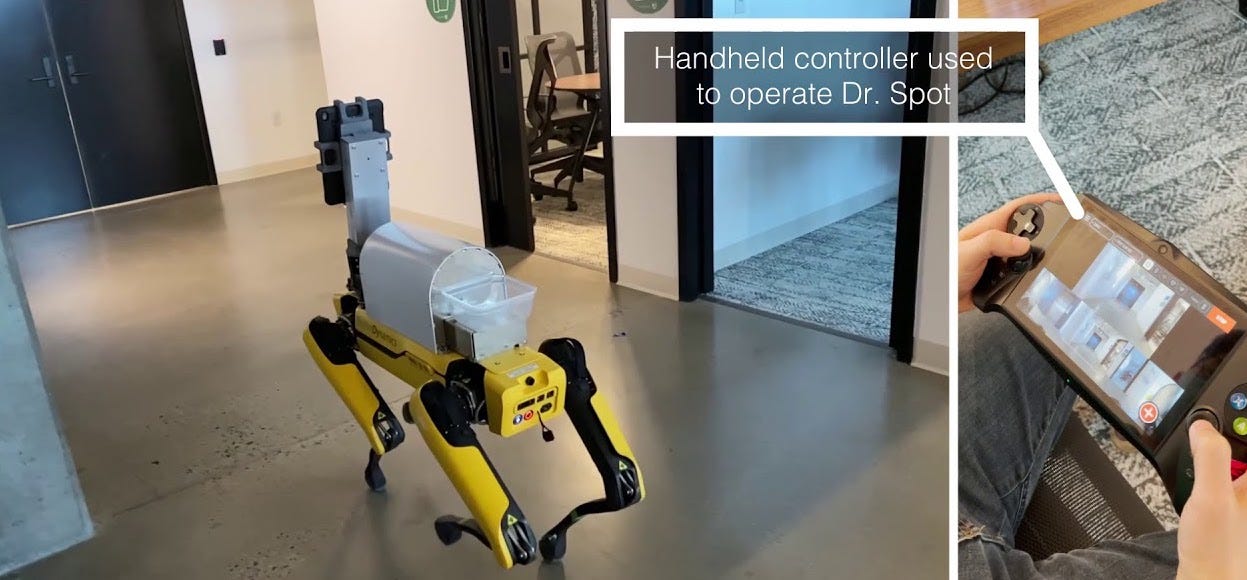More funding for community science please!
AmeriCorps for science, enhancement for Olympians, and robot doctors
When AmeriCorps was founded in the early 1990s, it was an uphill battle to get the program funded and off the ground. Republicans hated the idea. And while the program has been mostly a success, it has still seen its fair share of politically charged flare-ups.
Funding for some AmeriCorps programs has dwindled or dried up entirely in some rural communities, and science education in the nation has hit an embarrassing low. Now, a new idea is emerging to serve the needs of the moment: an American Science Corps! An editorial in Science last week suggests that what we need is a federally funded program to encourage young scientists to go out into communities and bridge the gap between people and research. Yes, duh!
Elite American universities lead in scientific R&D, but low-income and even middle-class students are underrepresented. Clinical trials, a core part of medical research, often do not reflect America's demographic and socioeconomic diversity. A recent poll reported that more than 80% of Americans could not name a living scientist.
😱
The editors point out that when community members are not scientifically literate, they are more likely to endanger everyone else by not trusting emerging technologies that can protect us from future pandemics or climate apocalypse, and might even work against new tech out of ignorance and fear.
But guess what? The US already has a network of community scientists ready and willing to grab federal dollars they’ve been missing, do boots-on-the-ground science communication, and work hard to educate the public. Community labs, biohackers—and the wider Community Bio movement—should leap at the chance to join together with young academic researchers, welcome them to their neighborhoods, and create a new American emphasis on science discovery. For the first time, I have hope that we can work together to fix this corrosive societal malignancy. Cheers to this idea, let’s make it happen! 🍻
Here’s the latest:
The case for more doping in the Olympics
What is purity of sport, anyway? In a new article for Neo.Life, I write that now is the time to have to have frank conversations about what we want the future of sports to look like. We must consider that while our ideas about fairness in competition are changing, that might not be a bad thing in the age of enhancement. In reporting this piece, I spoke to some fascinating people, including an eight-time Paralympic medalist.
Esther the Biohacker interviewed me for the Biohacking and Genetic Design Facebook Group
Learn about trust architecture and my thoughts on why Community Bio needs to start self-governing.
Would you let this robot treat you in the hospital?

A new version of Spot, the terrifying dog-like robot from Boston Dynamics, has been deployed to the front lines of the pandemic to triage incoming patients. And researchers hope it will do more:
The numbers from [a recent] study suggest that it could be worthwhile to try to develop robots that can perform procedures that currently require a lot of human effort, such as turning a patient over in bed, the researchers say.
This sounds awful! I’d be super freaked out, tbh!
The robot in question, developed by Boston Dynamics, is so scary that it was actually featured in a 2017 episode of “Black Mirror” in which a woman is hunted by the robodogs across an apocalyptic landscape. Every time I see “Spot” or any of the variants created by the Waltham-based company (now owned by Hyundai), I can only think of how useful and murderous they would be in wartime. I’m not alone here! The company has most recently become a depressing punchline for artists who let you control a Spot with a paintball gun attached in a game called “Spot’s Rampage.”
Would you want Spot taking your temperature in a hospital bed? Please no.
“Continuing to turn a blind eye to profiteering and anticompetitive practices damages the reputation of innovative companies.”
— A Nature Biotechnology editorial lectures the pharma industry about price gouging.
Your Fitbit is spying on you and we need to regulate it
“We are on a collision course with how to regulate health data as all the different types of wearables and health tech explode,” said my friend (and former boss) Carmel Shachar, executive director of the Petrie-Flom Center at Harvard Law School to Stat News. “HIPAA doesn’t extend to the world of health tech, and it should.”
The health information that your trackers and apps collect about you is not protected in the same way details from your latest check-up are. And, there’s nothing that stops apps from selling that data to others who want to learn more about us, whether that’s to target advertising or discriminate against certain users. For example, a fertility tracker app, Flo, has been accused of selling its users’ sensitive health data to Facebook and Google. In another instance, “multiple reports have found the majority of health and mental health apps routinely share user data without consent or even transparency about the practice,” including with Chinese firms.
Congress is moving (slowly) toward a fix, but it’s not enough, say legal experts.


